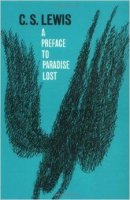 A Preface to "Paradise Lost" by C. S. Lewis (Oxford University Press, 1942)
A Preface to "Paradise Lost" by C. S. Lewis (Oxford University Press, 1942)
When C. S. Lewis writes a preface, it isn"t just a few pages stuck on the front of a book. His A Preface to "Paradise Lost" is itself a book. It's not one we have in our large collection of books by and about Lewis, but I was able to find it in PDF form and read it on my Kindle.
Confession: I have not read Milton's Paradise Lost. I'm sure my education is the worse because of that omission, and I could certainly see books that my teachers did inflict on me that Milton should have replaced. When, if ever, it will climb to the top of my current, very long reading list, I don't know. But at least now it is on my radar, and I know that I am better prepared for having read Lewis first.
I only have a few quotes, not because there isn't much more of value in the book, but because the format made it a lot harder to keep track of them.
pp 62-65
How are [the] gulfs between the ages to be dealt with by the student of poetry? A method often recommended may be called the method of The Unchanging Human Heart. According to this method the things which separate one age from another are superficial. Just as, if we stripped the armour off a medieval knight or the lace off a Caroline courtier, we should find beneath them an anatomy identical with our own, so, it is held, if we strip off from Virgil his Roman imperialism, from Sidney his code of honour, from Lucretius his Epicurean philosophy, and from all who have it their religion, we shall find the Unchanging Human Heart, and on this we are to concentrate. I held this theory myself for many years, but I have now abandoned it. ... How if these are not really the most important elements in the actual balance of the poem we are reading? Our whole study of the poem will then become a battle between us and the author in which we are trying to twist his work into a shape he never gave it.... I do not say that even on these terms we shall not get some value out of our reading; but we must not imagine that we are appreciating the works the old writers actually wrote.
Fortunately there is a better way. Instead of stripping the knight of his armour you can try to put his armour on yourself; instead of seeing how the courtier would look without his lace, you can try to see how you would feel with his lace; that is, with his honour, his wit, his royalism, and his gallantries... To enjoy our full humanity we ought, so far as is possible, to contain within us potentially at all times, and on occasion to actualize, all the modes of feeling and thinking through which man has passed. You must, so far as in you lies, become an Achaean chief while reading Homer, a medieval knight while reading Malory, and an eighteenth century Londoner while reading Johnson. Only thus will you be able to judge the work "in the same spirit that its author writ"....
We must therefore turn a deaf ear to Professor [Denis] Saurat when he invites us "to study what there is of lasting originality in Milton"s thought and especially to disentangle from theological rubbish the permanent and human interest." This is like asking us to study Hamlet after the "rubbish" of the revenge code has been removed, or centipedes when free of their irrelevant legs, or Gothic architecture without the pointed arches. Milton's thought, when purged of its theology, does not exist. Our plan must be very different—to plunge right into the "rubbish," to see the world as if we believed it, and then, while we still hold that position in our imagination, to see what sort of a poem results.
This puts me in mind of the way I've heard that actors prepare for their rôles: To play Richard III one must as much as possible become Richard III. I see why acting can be a spiritually dangerous profession! I read recently of an incident where actor Michael Weatherly was accused of making sexually inappropriate comments to one of his coworkers. No matter what one might think of his supposed comments, I don't see how anyone can be shocked that he might say something inappropriate given thirteen seasons of total immersion in the NCIS character Tony DiNozzo—whose stock-in-trade was just such language and actions.
pp 100-101
In all but a few writers the "good" characters are the least successful, and every one who has ever tried to make even the humblest story ought to know why. To make a character worse than oneself it is only necessary to release imaginatively from control some of the bad passions which, in real life, are always straining at the leash.... But if you try to draw a character better than yourself, all you can do is to take the best moments you have had and to imagine them prolonged and more consistently embodied in action. But the real high virtues which we do not possess at all, we cannot depict except in a purely external fashion. We do not really know what it feels like to be a man much better than ourselves. His whole inner landscape is one we have never seen, and when we guess it we blunder. It is in their "good" characters that novelists make, unawares, the most shocking self-revelations. Heaven understands Hell and Hell does not understand Heaven, and all of us, in our measure, share the ... blindness. To project ourselves into a wicked character, we have only to stop doing something, and something that we are already tired of doing; to project ourselves into a good one we have to do what we cannot and become what we are not.
It is worth noting that elsewhere Lewis praises George MacDonald for being that very rare writer who can portray goodness much better than evil.
p 137
The older Puritans took away the maypoles and the mince-pies, but they did not bring in the millennium; they only brought in the Restoration.
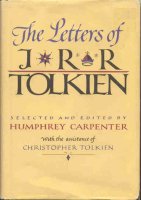 The Letters of J. R. R. Tolkien edited by Humphrey Carpenter (Houghton Mifflin Company, 1981)
The Letters of J. R. R. Tolkien edited by Humphrey Carpenter (Houghton Mifflin Company, 1981)
It may seem as if I've copied the whole book, but is a lot of value in those 463 pages. It's too long, perhaps, for anyone not a Tolkien fan, but it's a fascinating look not only into the life and mind of the creator of The Lord of the Rings, but into his times and society as well.
Herewith only a small sample.
Page 17
An American publisher showed interest in The Hobbit, adding that they would like more illustrations and suggesting the employment of good American artists. Tolkien was amenable but had one concern:
It might be advisable, rather than lose the American interest, to let the Americans do what seems good to them—as long as it was possible ... to veto anything from or influenced by the Disney studios (for all whose works I have a heartfelt loathing).
Page 46
At any minute it is what we are and are doing, not what we plan to be and do that counts.
Page 68
[C. S. ] Lewis is as energetic and jolly as ever, but getting too much publicity for his or any of our tastes. [One publication], usually fairly reasonable, did him the doubtful honour of a peculiarly misrepresentative and asinine paragraph.... It began "Ascetic Mr. Lewis"—!!! I ask you! He put away three pints in a very short session we had this morning, and said he was "going short for Lent." I suppose all the stuff you see in print is about as accurate about Tom, Dick, or Harry. It is a pity newspapers can't leave people alone, and don't make some effort to understand what they say (if it is worth it): at any rate they might have some standards that would prevent them saying things about people which are quite untrue, even if not actually (as often) painful, angering, or indeed injurious....
Pages 97-98
Both the sexual and the sacred [curse] words have ceased to have any content except the ghost of past emotion. I don't mean that it is not a bad thing, and it is certainly very wearisome, saddening and maddening, but it is at any rate no blasphemy in the full sense.
Page 98
I include the following fan letter excerpt simply for the name of the school, which will have meaning to our family.
Dear Mr Tolkien, I have just finished reading your book The Hobbit for the 11th time and I want to tell you what I think of it. I think it is the most wonderful book I have ever read. It is beyond description ... Gee Whiz, I'm surprised that it's not more popular ... If you have written any other books, would you please send me their names?
John Barrow 12 yrs.
West town School, West town, Pa.
Page 111
Jive and Boogie-Woogie [are] essentially vulgar, music corrupted by the mechanism, echoing in dreary unnourished heads.
The appalling destruction and misery of this war mount hourly: destruction of what should be (indeed is) the common wealth of Europe, and the world, if mankind were not so besotted, wealth the loss of which will affect us all, victors or not. ... There seem no bowels of mercy or compassion, no imagination, left in this dark diabolic hour. By which I do not mean that it may not all, in the present situation ... be necessary and inevitable. But why gloat! We were supposed to have reached a stage of civilization in which it might still be necessary to execute a criminal, but not to gloat, or to hang his wife and child by him while the orc-crowd hooted. The destruction of Germany, be it 100 times merited, is one of the most appalling, world-catastrophes.
Pages 122-123 (from a letter to his publisher)
The thing is to finish the thing as devised and then let it be judged. But forgive me! It is written in my life-blood, such as that is, thick or thin; and I can no other. I fear it must stand or fall as it substantially is. It would be idle to pretend that I do not greatly desire publication, since a solitary art is no art; nor that I have not a pleasure in praise, with as little vanity as fallen man can manage (he has not much more share in his writings than in his children of the body, but it is something to have a function); yet the chief thing is to complete one's work, as far as completion has any real sense.
Page 128
I write only because I find it easier to say such things as I really want to say. If they are foolish or seem so, I am not present when they fall flat.
Page 131
This university business of earning one's living by teaching, delivering philological lectures, and daily attendance at "boards" and other talk-meetings, interferes sadly with serious work.
Page 218
My work did not "evolve" into serious work. It started like that. [The Hobbit] was a fragment, torn out of an already existing mythology. In so far as it was dressed up as "for children," in style or manner, I regret it. So do the children.
I avoid hobbies because I am a very serious person and cannot distinguish between private amusement and duty.
I am affable, but unsociable.
Page 220
I am (obviously) much in love with plants and above all trees, and always have been; and I find human maltreatment of them as hard to bear as some find ill-treatment of animals.
Page 249
I find that many children become interested, even engrossed, in The Lord of the Rings, from about 10 onwards. I think it rather a pity, really. It was not written for them. But then I am a very "unvoracious" reader, and since I can seldom bring myself to read a work twice I think of the many things that I read—too soon! Nothing, not even a (possible) deeper appreciation, for me replaces the bloom on a book, the freshness of the unread.
Page 257
[The completion of The Lord of the Rings] still astonishes me. A notorious beginner of enterprises and non-finisher, partly through lack of time, partly through lack of single-minded concentration, I still wonder how and why I managed to peg away at this thing year after year, often under real difficulties, and bring it to a conclusion.
Pages 266-267
In 1958, Tolkien and his publisher were considering a film proposal that eventually fell through.
[The story line document] is sufficient to give me grave anxiety about the actual dialogue that (I suppose) will be used. I should say [Morton Grady] Zimmerman, the constructor of this s-l, is quite incapable of excerpting, or adapting the "spoken words" of the book. He is hasty, insensitive, and impertinent.
He does not read books. It seems to me evident that he has skimmed through the L.R. at a great pace, and then constructed his s.l. from partly confused memories, and with the minimum of references back to the original. Thus he gets most of the names wrong in form—not occasionally by casual error but fixedly (always Borimor for Boromir); or he misapplies them: Radagast becomes an Eagle. The introduction of characters and the indications of what they are to say have little or no reference to the book....
I feel very unhappy about the extreme silliness and incompetence of Z and his complete lack of respect for the original (it seems wilfully wrong without discernible technical reasons at nearly every point). But I need, and shall soon need very much indeed, money, and I am conscious of your rights and interests; so that I shall endeavour to restrain myself, and avoid all avoidable offence.
Page 271
In another letter, Tolkien sets out in detail some of his objections. I fear he would also apply the following judgment (as well as many others that I won't take the space to quote here), to Peter Jackson's version, had he had the chance to see the film that is now nearly synonymous with his book.
He has cut the parts of the story upon which its characteristic and peculiar tone principally depends, showing a preference for fights; and he has made no serious attempt to represent the heart of the tale....
Page 297
When I published The Hobbit—hurriedly and without due consideration—I was still influenced by the convention that "fairy-stories" are naturally directed to children (with or without the silly added waggery "from seven to seventy"). And I had children of my own. But the desire to address children, as such, had nothing to do with the story as such in itself or the urge to write it. But it had some unfortunate effects on the mode of expression and narrative method, which if I had not been rushed, I should have corrected. Intelligent children of good taste (of which there seem quite a number) have always, I am glad to say, singled out the points in manner where the address is to children as blemishes.
Page 310
Children are not a class or kind, they are a heterogeneous collection of immature persons, varying, as persons do, in their reach, and in their ability to extend it when stimulated. As soon as you limit your vocabulary to what you suppose to be within their reach, you in fact simply cut off the gifted ones from the chance of extending it.
Page 321
There was a great tree—a huge poplar with vast limbs—visible through my window even as I lay in bed. I loved it, and was anxious about it. It had been savagely mutilated some years before, but had gallantly grown new limbs—though of course not with the unblemished grace of its former natural self; and now a foolish neighbour was agitating to have it felled. Every tree has its enemy, few have an advocate.
Page 323
Well here comes Christmas! That astonishing thing that no "commercialism" can in fact defile—unless you let it.
Page 336
Years before I had rejected as disgusting cynicism by an old vulgarian the words of warning given me by old Joseph Write. "What do you take Oxford for, lad?" "A university, a place of learning." "Nay, lad, it's a factory! And what's it making? I'll tell you. It's making fees. Get that into your head, and you'll begin to understand what goes on."
Alas! by 1935 I new knew that it was perfectly true.
Page 394
The "protestant" search backwards for "simplicity" and directness—which, of course, though it contains some good or at least intelligible motives, is mistaken and indeed vain. Because "primitive Christianity" is now and in spite of all "research" will ever remain largely unknown; because "primitiveness" is no guarantee of value, and is and was in great part a reflection of ignorance. Grave abuses were as much an element in Christian "liturgical" behaviour from the beginning as now. (St. Paul's strictures on eucharistic behaviour are sufficient to show this!) Still more because "my church" was not intended by Our Lord to be static or remain in perpetual childhood; but to be a living organism (likened to a plant), which develops and changes in externals by the interaction of its bequeathed divine life and history—the particular circumstances of the world into which it is set. There is no resemblance between the "mustard seed" and the full-grown tree. For those living in the days of its branching growth the Tree is the thing, for the history of a living thing is part of its life, and the history of a divine thing is sacred. The wise may know that it began with a seed, but it is vain to try and dig it up, for it no longer exists, and the virtue and powers that it had now reside in the Tree.
Page 396
I have only since I retired learned that I was a successful professor. I had no idea that my lectures had such an effect—and, if I had, they might have been better. My "friends" among dons were chiefly pleased to tell me that I spoke too fast and might have been interesting if I could be heard. True often: due in part to having too much to say in too little time, in larger part to diffidence, which such comments increased.
Pages 401-402 (written in November 1969)
What a dreadful, fear-darkened, sorrow-laden world we live in—especially for those who have also the burden of age, whose friends and all they especially care for are afflicted in the same way. Chesterton once said that it is our duty to keep the Flag of This World flying: but it takes now a sturdier and more sublime patriotism than it did then. Gandalf added that it is not for us to choose the times into which we are born, but to do what we could to repair them; but the spirit of wickedness in high places is now so powerful and so many-headed in its incarnations that there seems nothing more to do than personally to refuse to worship any of the hydras' heads.
Page 403
I am wholly in favour of the "dull stodges." I had once a considerable experience of what are/were probably England's most (at least apparently) dullest and stodgiest students: Yorkshire's young men and women of sub-public school class and home backgrounds bookless and cultureless. ... A surprisingly large proportion prove "educable": for which a primary qualification is the willingness to do some work (to learn) (at any level of intelligence). Teaching is a most exhausting task. But I would rather spend myself on removing the "dull" from "stodges"—providing some products of [B to B+] quality that retain some sanity—a hopeful soil from which another generation with some higher intelligence could arise. Rather—rather than waste effort on those of (apparently at any rate) higher intelligence that have been corrupted and disintegrated by school, and the "climate" of our present days. Teaching an organized subject is simply not the instrument for their rehabilitation—if anything is.
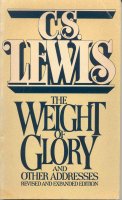 The Weight of Glory and Other Addresses by C. S. Lewis (Macmillan Books, 1980; talks originally given from the 1930s through the 1950s)
The Weight of Glory and Other Addresses by C. S. Lewis (Macmillan Books, 1980; talks originally given from the 1930s through the 1950s)
Once again, this is not a review—though I highly recommend the book—but a collection to replace the sticky notes I had affixed to this book as I re-read it recently. With some comments. The emphasis is my own.
From "The Weight of Glory"
Next to the Blessed Sacrament itself, your neighbour is the holiest object presented to your senses. If he is your Christian neighbour, he is holy in almost the same way, for in him also Christ ... is truly hidden.
From "Learning in Wartime"
A cultural life will exist outside the Church whether it exists inside or not. To be ignorant and simple now—not to be able to meet the enemies on their own ground—would be to throw down our weapons, and to betray our uneducated brethren.... Good philosophy must exist, if for no other reason, because bad philosophy needs to be answered. The cool intellect must work not only against cool intellect on the other side, but against the muddy heathen mysticisms which deny intellect altogether. Most of all, perhaps, we need intimate knowledge of the past. Not that the past has any magic about it, but because we cannot study the future, and yet need something to set against the present, to remind us that the basic assumptions have been quite different in different periods and that much which seems certain to the uneducated is merely temporary fashion. A man who has lived in many places is not likely to be deceived by the local errors of his native village; the scholar has lived in many times and is therefore in some degree immune from the great cataract of nonsense that pours from the press and the microphone of his own age.
There are always plenty of rivals to our work. We are always falling in love or quarrelling, looking for jobs or fearing to lose them, getting ill and recovering, following public affairs. If we let ourselves, we shall always be waiting for some distraction or other to end before we can really get down to our work. The only people who achieve much are those who want knowledge so badly that the seek it while the conditions are still unfavorable. Favourable conditions never come.
From "Why I Am Not a Pacifist"
Why I am not a fan of the movement to "not impose our moral and religious values on our children, but leave them free to make up their own minds."
Human beings must be trained in obedience to the moral intuitions almost before they have them, and years before they are rational enough to discuss them, or they will be corrupted before the time for discussion arrives.
We have seen that every moral judgment involves facts, intuition, and reasoning, and, if we are wise enough to be humble, it will involve some regard for authority as well. Its strength depends on the strength of these four factors. Thus if I find that the facts on which I am working are clear and little disputed, that the basic intuition is unmistakably an intuition, that the reasoning which connects this intuition with the particular judgment is strong, and that I am in agreement or (at worst) not in disagreement with authority, then I can trust my moral judgment with reasonable confidence. And if, in addition, I find little reason to suppose that any passion has secretly swayed my mind, this confidence is confirmed. If, on the other hand, I find the facts doubtful, the supposed intuition by no means obvious to all good men, the reasoning weak, and authority against me, then I ought to conclude that I am probably wrong. And if the conclusion which I have reached turns out also to flatter some strong passion of my own, then my suspicion should deepen into moral certainty. By "moral certainty" I mean that degree of certainty proper to moral decisions; for mathematical certainty is not here to be looked for.
It may be asked whether, faint as the hope is of abolishing war by Pacifism, there is any other hope. But the question belongs to a mode of thought which I find quite alien to me. It consists in assuming that the great permanent miseries in human life must be curable if only we can find the right cure; and it then proceeds by elimination and concludes that whtever is left, however unlikely to prove a cure, must nevertheless do so. Hence the fanaticism of Marxists, Freudians, Eugenists, Spiritualists, Douglasites, Federal Unionists, Vegetarians, and all the rest. But I have received no assurance that anything we can do will eradicate suffering. I think the best results are obtained by people who work quietly away at limited objectives, such as the abolition of the slave trade, or prison reform, or factory acts, or tuberculosis, not by those who think they can achieve universal justice, or health, or peace. I think the art of life consists in tackling each immediate evil as well as we can. To avert or postpone one particular war by wise policy, or to render one particular campaign shorter by strength and skill or less terrible by mercy to the conquered and the civilians is more useful than all the proposals for universal peace that have ever been made, just as the dentist who can stop one toothache has deserved better of humanity than all the men who think they have some scheme for producing a perfectly healthy race.
From "Is Theology Poetry"
We should distinguish Evolution in the strict [biological] sense from what may be called the universal evolutionism of modern thought. By universal evolutionism I mean the belief that the very formula of universal process is from imperfect to perfect, from small beginnings to great endings, from the rudimentary to the elaborate, the belief which makes people find it natural to think that morality springs from savage taboos, adult sentiment from infantile sexual maladjustments, thought from instinct, mind from matter, organic from inorganic, cosmos from chaos. This is perhaps the deepest habit of mind in the contemporary world. It seems to me immensely unplausible, because it makes the general course of nature so very unlike those parts of nature we can observe. You remember the old puzzle as to whether the owl came from the egg or the egg from the owl. The modern acquiescence in universal evolutionism is a kind of optical illusion, produced by attending exclusively to the owl's emergence from the egg. We are taught from childhood to notice how the perfect oak grows from the acorn and to forget that the acorn itself was dropped by a perfect oak. We are reminded constantly that the adult human being was an embryo, never that the life of the embryo came from two adult human beings.
From "Membership"
This lecture was given in 1945. Read the next paragraph and try to imagine what Lewis might think nearly 75 years later.
When I first went to Oxford the typical undergraduate society consisted of a dozen men, who knew one another intimately, hearing a paper by one of their own number in a small sitting-room and hammering out their problem till one or two in the morning. Before [World War II] the typical undergraduate society had come to be a mixed audience of one or two hundred students assembled in a public hall to hear a lecture from some visiting celebrity. Even on those rare occasions when a modern undergraduate is not attending some such society he is seldom engaged in those solitary walks, or walks with a single companion, which built the minds of the previous generations. He lives in a crowd; caucus has replaced friendship. And this tendency not only exists both within and without the university, but is often approved. There is a crowd of busybodies, self-appointed masters of ceremonies, whose life is devoted to destroying solitude wherever solitude still exists. ... If an Augustine, a Vaughan, a Traherne, or a Wordsworth should be born in the modern world, the leaders of a youth organization would soon cure him. If a really good home, such as the home of Alcinous and Arete in the Odyssey or the Rostovs in War and Peace or any of Charlotte M. Young's families, existed today, it would be denounced as bourgeois and every engine of destruction would be levelled against it. And even where the planners fail and someone is left physically by himself, the wireless has seen to it that he will be ... never less alone than when alone. We live, in fact, in a world starved for solitude, silence, and privacy, and therefore starved for meditation and true friendship.
I have wanted to try to expel that quite un-Christian worship of the human individual simply as such which is so rampant in modern thought side by side with our collectivism, for one error begets the opposite error and, far from neutralising, they aggravate each other. I mean the pestilent notion ... that each of us starts with a treasure called "personality" locked up inside him, and that to expand and express this, to guard it from interference, to be "original," is the main end of life. This is Pelagian, or worse, and it defeats even itself. No man who values originality will ever be original. But try to tell the truth as you see it, try to do any bit of work as well as it can be done for the work's sake, and what we call originality will come unsought.
Here are four poems that struck me in particular from a book of C. S. Lewis' collected poems.
Irresponsible actions have consequences.
Pan’s Purge
I dreamt that all the planning of peremptory humanity
Had crushed Nature finally beneath the foot of Man;
Birth-control and merriment, Earth completely sterilized,
Bungalow and fun-fair, had fulfilled our Plan;
But the lion and the unicorn were sighing at the funeral,
Crying at the funeral
Sobbing at the funeral of the god Pan.And the elephant was crying. The pelican in his piety
Struck his feathered bosom till the blood ran,
And howling at humanity the owl and iguanodon,
The bittern and the buffalo, their dirge began,
But dangerously, suddenly, a strange ecstatic shuddering
A change that set me shuddering
Through all the wailful noises of the beasts ran.No longer were they sorrowful, but stronger and more horrible,
It had only been a rumour of the death of Pan.
The scorpions and the mantichores and corpulent tarantulas
Were closing in around me, hissing, Long Live Pan!
And forth with rage unlimited the North Wind drew his scimitar
In wrath with ringing scimitar
He came, with sleet and shipwreck, for the doom of Man.And now, descending, ravening, loud and large, the avalanche,
And after it the earthquake, was loosed upon Man.
Towering and cloven-hoofed, the power of Pan came over us,
Stamped, bit, tore, broke. It was the end of Man;
Except where saints and savages were kept from his ravaging,
And crept out when the ravaging
Was ended, on an empty earth. The new world began.A small race — a smiling heaven — all round the silences
Returned; there was comfort for corrected Man.
Flowered turf had swallowed up the towered cities; following
His flocks and herds where nameless, untainted rivers ran,
Leisurely he pondered, at his pleasure wandering,
Measurelessly wandering...
Clear, on the huge pastures, the young voice of Man.
Shades of the Irish Rovers!
The Late Passenger
The sky was low, the sounding rain was falling dense and dark,
And Noah’s sons were standing at the window of the Ark.The beasts were in, but Japhet said, “I see one creature more
Belated and unmated there comes knocking at the door.”“Well, let him knock or let him drown,” said Ham, “or learn to swim.
We’re overcrowded as it is; we’ve got no room for him.”“And yet it knocks, how terribly it knocks,” said Shem. “Its feet
Are hard as horn—but oh the air that comes from it is sweet.”“Now hush!” said Ham, “You’ll waken Dad, and once he comes to see
What’s at the door, it’s sure to mean more work for you and me.”Noah’s voice came roaring from the darkness down below,
“Some animal is knocking. Let it in before we go.”Ham shouted back, and savagely he nudged the other two,
“That’s only Japhet knocking down a brad-nail in his shoe.”Said Noah, “Boys, I hear a noise that’s like a horse’s hoof.”
Said Ham, “Why, that’s the dreadful rain that drums upon the roof.”Noah tumbled up on deck and out he put his head;
His face went grey, his knees were loosed, he tore his beard and said,“Look, look! It would not wait. It turns away. It takes its flight.
Fine work you’ve made of it, my sons, between you all to-night!"Even if I could outrun it now, it would not turn again
—Not now. Our great discourtesy has earned its high disdain."Oh noble and unmated beast, my sons were all unkind;
In such a night what stable and what manger will you find?"Oh golden hoofs, oh cataracts of mane, oh nostrils wide
With indignation! Oh the neck wave-arched, the lovely pride!"Oh long shall be the furrows ploughed upon the hearts of men
Before it comes to stable and to manger once again,"And dark and crooked all the roads in which our race will walk,
And shrivelled all their manhood like a flower with broken stalk,"And all the world, oh Ham, may curse the hour when you were born;
Because of you the Ark must sail without the Unicorn.”
It's presented as a poem, but to anyone familiar with the hymn, "Lead Us, Heavenly Father, Lead Us" it's a song that sings itself.
Evolutionary Hymn
Lead us, Evolution, lead us
Up the future's endless stair;
Chop us, change us, prod us, weed us.
For stagnation is despair:
Groping, guessing, yet progressing,
Lead us nobody knows where.Wrong or justice, in the present,
Joy or sorrow, what are they
While there's always jam-tomorrow,
While we tread the onward way?
Never knowing where we're going,
We can never go astray.To whatever variation
Our posterity may turn
Hairy, squashy, or crustacean,
Bulbous-eyed or square of stern,
Tusked or toothless, mild or ruthless,
Towards that unknown god we yearn.Ask not if it's god or devil,
Brethren, lest your words imply
Static norms of good and evil
(As in Plato) throned on high;
Such scholastic, inelastic,
Abstract yardsticks we deny.Far too long have sages vainly
Glossed great Nature's simple text;
He who runs can read it plainly,
"Goodness = what comes next."
By evolving, Life is solving
All the questions we perplexed.On then! Value means survival-
Value. If our progeny
Spreads and spawns and licks each rival,
That will prove its deity
(Far from pleasant, by our present
Standards, though it may well be).
And finally,
The Apologist's Evening Prayer
From all my lame defeats and oh! much more
From all the victories that I seemed to score;
From cleverness shot forth on Thy behalf
At which, while angels weep, the audience laugh;
From all my proofs of Thy divinity,
Thou, who wouldst give no sign, deliver me.Thoughts are but coins. Let me not trust, instead
Of Thee, their thin-worn image of Thy head.
From all my thoughts, even from my thoughts of Thee,
O thou fair Silence, fall, and set me free.
Lord of the narrow gate and the needle’s eye,
Take from me all my trumpery lest I die.
 Go Wild: Free Your Body and Mind from the Afflictions of Civilization by John J. Ratey and Richard manning (Little, Brown and Company, 2014)
Go Wild: Free Your Body and Mind from the Afflictions of Civilization by John J. Ratey and Richard manning (Little, Brown and Company, 2014)
I've neither the time nor the inclination for a full review of Go Wild, which I borrowed from the library while waiting for them to acquire Spark, another book by John Ratey, which was highly recommended by a friend. Fortunately, the friend said about Go Wild that she found it good but not worth paying for, so I'm still looking forward to Spark. I found Go Wild too annoying to call "good," but I am glad I read it, as there's a reasonable amount of inspiring information in it.
To begin with, the author pushes several wrong buttons for me, from the trivial to the overwhelming. As an example of the former, there's this (emphasis mine):
Even the child's song knows that the leg bone is connected to the thigh bone; we mean to press this idea a lot further to provide some appreciation of the enormous complexity and interconnectedness of the various elements of human life.
I'm sure he's referring to the spiritual, Dem Bones, which is not a child's song, even if it might end up in a collection of songs intended for children. And I know there are different versions, as there always are with songs of the people, but all the versions I've found acknowledge that the thigh bone is connected to the knee and the hip, not the "leg bone" (or "shin bone" as I know it). Yes, it's trivial—but to me it points to carelessness on the part of the author, which doesn't increase my confidence in what he says. (Or maybe I should blame his proofreaders.) There are other occasions where I get the same feeling.
Then there's this, which to me undercuts all his arguments: I'm fine with evolution as a scientific theory of origins and change. I'd go so far as to say it does an excellent job of explaining much of the available data. But I am not okay with evolution personified and deified, which is what happens in this book. All over, everywhere: "Evolution endowed," "evolution created," "evolution designed." Not only is evolution the basis for all the book's arguments, but the language makes evolution seem like a living, sentient, personal entity—though not, the authors are careful to point out, a loving one.
I was late in coming to the appreciation of religion, but I've always loved science. The religion of science horrifies me, however, and with that this book abounds. Add to that a significant dose of Eastern spirituality, and the feeling that the authors have been, perhaps, a little too selective in the studies they choose to believe—well, I wasn't too happy with the book.
It's also hard to take too seriously someone who—although he loves the outdoors and runs ultramarathons, will also drive 45 minutes to find a gym in the middle of nowhere.
That said, it's almost amazing that I found much of value here, but I did.
The authors cover a lot of ground. Here's a brief summary, although it doesn't come close to doing the ideas justice.
Overall
- Do what works for you. There is no one-size-fits-all. Take the first step in any of the areas they recommend changing, and you will find yourself gradually taking on more and more.
Food
- Don't eat sugar in any form.
- Eat no wheat, rice, oats, or any other grain, not even in whole-grain form. No high-carb vegetables like sweet potatoes. No manufactured fats, no processed food, no fast food.
- Eat eggs, grass-finished beef, cold-water fish, nuts, simple fresh fruits and vegetables—but no fruit juices.
- Variety is important—as long as you avoid the long list of don'ts.
Movement
- Find a form of exercise you like, and do it.
- Exercise that invovles a variety of movements, the whole body, and lots of variation is best.
- Exercise is better out in nature.
- Exercise is better with other people.
Sleep
- Get more sleep. If you live in 21st century America, it's guaranteed you're not getting enough sleep.
- Sleeping in the same room with the rest of your family is more healthful. (And we thought better sleep at the Maggie P. was due to the salt air.)
- Don't make your babies sleep alone.
- Soothing sounds, such as a crackling fire, or trusted adults moving around and talking quietly, lead to more satisfying sleep.
- Sleep doesn't have to happen all at once. Naps are fine. If you find yourself lying awake in the middle of the night, don't fight it, but get up and do something. Go back to bed later.
Awareness
- The authors clearly admire Eastern spirituality, and thus promote the practice of meditation. But what they are trying to replicate is the relaxed hyper-awareness common among hunter-gatherer peoples, an ability to calm the brain of distractions while being alert—even more alert than otherwise. This turns out to be good for both brain and body health.
Nature
- Being out in nature is enormously healthful. Even an indoor potted plant helps.
People
- We need other people. We need our own "tribe."
- I wish he had dealt with the differences between introverts and extroverts in this section. We all need people, but they way we need each other is very different for the different personality types, and the authors appear to consider only the extrovert point of view.
As usual, this started out as the place to record a few interesting quotations, and ended up being a long review after all, though my summary did peter out at the end. There's a lot to think about here. I steadfastly reject the authors' extremes: for example, when it comes to food I am an omnivore by inclination but even more by principle, and I would no more adopt this no-carb regimen than I would go vegetarian. At the same time, it's good to eat a lot of vegetables, and it's also good to reduce our intake of carbohydrates, at least of the empty variety. I won't become a marathon runner, much less tackle an ultramarathon—but the book's thesis on the importance of movement is not only convincing, but provides inspiration to do things I've known for a long time that I should be doing.
Here are the random quotes:
Cows evolved to eat grass, but mostly we no longer feed them grass; we feed them the corn and soybeans that are the prime products of our industrial agriculture system. The practice of fattening beef in feedlots and the preponderance of factory beef in the fast-food system passes this omega-3 shortage into our bodies. ... [T]his is also why eating red meat itself has gotten a bad rap, with endless strings of studies linking it to heart disease and a variety of other issues. The beef that is the basis of these conclusions is factory beef, and no wonder.
Although I agree with the authors' complaint that the studies were made with the wrong kind of beef, they provide no evidence that beef from grass-fed cows does not have the same bad effects. I suspect that to be the case, but a citation of some evidence would have been nice.
[W]e begin to understand why social sleeping seems to be a nearly universal characteristic of cultures.... While we are sleeping, we continue to monitor our surroundings for cues of safety: relaxed conversation, relaxed movement of others, popping fire. Those cues, subtle sounds signaling safely, tell us we can retreat to our deepest sleep.
Many cultures are, in fact, conscious of all of this and the importance of these arrangements, and no place is the importance more pronounced than in the case of infants. ... All of this helps explain ... an almost universal perplexed response among most other cultures upon hearing of the Western practice of making babies sleep alone. "They think of this as child abuse. They literally do."
A very recent paper correlates an increase in the incidence of autism with receiving Pitocin during delivery. [Neurobiologist Sue Carter] says that Pitocin is routinely administered to delivering mothers in, she estimates, 90 percent of cases, although there are some signs that this practice is waning.
Why does aggression persist beyond reasons for it? Why are we so riven with senseless killing and warfare?
I picked up on that last one just because it highlights the central problem for people who have no sense of the reality of sin, only of its consequences.
The vagus nerve links up all the tools we need to respond to an existential threat, and so the vagal brake is a signal sent through the system for everything to stand down and engage—at ease. ... There is a simple measure of this. It can be read in the tension or lack of tension in facial muscles, heard in voice timbre and edge, and counted in rate of respiration. ... There is such a thing as vagal tone, completely analogous to muscle tone—and the tone shows how clear and distinct a given individual's ability to apply the brake is.
The vagal brake can be driven by breath, a clear connection readable as blips on a chart. You are in control of your breath, to some degree. Thus, this is not simply a point for measuring or sensing arousal; it is a point for controlling arousal and, downstream, the health problems that stem from lack of control.
If you force yourself to smile, the specific spots in the brain that register depression suddenly say your depression is better. ... It turns out that a halfway, forced smile won't do the trick, because it won't light up the neurons of increased happiness in your brain. But if that forced smile goes so far as to engage the little muscles in the corners of your eyes—that is, if you do what socially adept people understand instinctively—these neurons do indeed light up. And the muscles at the corners of your eyes are within the reach of the vagus nerve.
[The breath] exerts control through the alarm system that is the autonomic nervous system. [Researcher Stephen Porges] says he realized a long time ago—because he is a musician, specifically a horn player—that the act of controlling the breath to control the rhythm of music and at the same time engaging the brain to execute the mechanics of music works like a mental therapy. To his mind, it has all the elements of pranayama yoga, a form of yoga that stresses breath control.
The act of controlling the breath has a parallel brain response of calming our instincts for fear and danger. It's easy enough to see this in deliberate practices like yoga, but the same idea applies in many more time-honored practices: choral singing, Gregorian chants, even social music like bluegrass or blues derived from the chants and work songs that African slaves developed to help them tolerate oppression.
Music or evidence of music appeared fifty thousand years ago in that sudden flourish of evidence of cultural evolution that defined humans as humans—and ever since, music has loomed as a cultural universal. All known cultures and people make music. Yet all of this also suggests that we lose something when the crane's leg bone gets replaced by an iPod. We lose the benefits of sitting in a circle of fellow humans and driving the breath and beat that drives the music. [Emphasis mine]
As my friend said, Go Wild is worth reading—but not worth buying. If what I can only describe as bizarre spirituality—bizarre for a book that claims to be scientific—doesn't bother you, and if you can overlook the extremities, which are at their worst in the section on food, there are a number of interesting and worthwhile points.
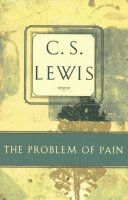 The Problem of Pain by C. S. Lewis (Simon & Schuster, 1986; originally published 1940)
The Problem of Pain by C. S. Lewis (Simon & Schuster, 1986; originally published 1940)
This is not a review, but a collection to replace the sticky notes I had affixed to this book as I re-read it recently. With some comments. The emphasis is my own.
Chapter Three: Divine Goodness
The association of ... man and dog is primarily for the man's sake: he tames the dog primarily that he may love it, not that it may love him, and that it may serve him, not that he may serve it. Yet at the same time, the dog's interests are not sacrificed to the man's. The one end (that he may love it) cannot be fully attained unless it also, in its fashion, loves him, nor can it serve him unless he, in a different fashion, serves it. Now just because the dog is by human standards one of the "best" of irrational creatures, and a proper object for a man to love—of course with that degree and kind of love which is proper to such an object, and not with silly anthropomorphic exaggerations—man interferes with the dog and makes it more lovable than it was in mere nature. In its state of nature it has a smell, and habits, which frustrate man's love: he washes it, house-trains it, teaches it not to steal, and is so enabled to love it completely. To the puppy the whole proceeding would seem, if it were a theologian, to cast grave doubts on the "goodness" of man: but the full-grown and full-trained dog, larger, healthier, and longer-lived than the wild dog, and admitted, as it were by Grace, to a whole world of affections, loyalties, interests, and comforts entirely beyond its animal destiny, would have no such doubts.
The man (I am speaking throughout of the good man) takes all these pains with the dog, and give all these pains to the dog, only because it is an animal high in the scale—because it is so nearly lovable that it is worth his while to make it fully lovable. He does not house-train the earwig or give baths to centipedes. We may wish, indeed, that we were of so little account to God that He left us alone to follow our natural impulses—that He would give over trying to train us into something so unlike our natural selves: but ... we are asking not for more Love, but for less.
Chapter Four: Human Wickedness
This chapter will have been misunderstood if anyone describes it as a reinstatement of the doctrine of Total Depravity. I disbelieve that doctrine, partly on the logical ground that if our depravity were total we should not know ourselves to be depraved, and party because experience shows us much goodness in human nature. Nor am I recommending universal gloom. The emotion of shame has been valued not as an emotion but because of the insight to which it leads. I think that insight should be permanent in each man's mind: but whether the painful emotions that attend it should also be encouraged, is a technical problem of spiritual direction on which, as a layman, I have little call to speak. My own idea, for what it is worth, is that all sadness which is not either arising from the repentance of a concrete sin and hastening towards concrete amendment or restitution, or else arising from pity and hastening to active assistance, is simply bad; and I think we all sin by needlessly disobeying the apostolic injunction to "rejoice" as much as by anything else. Humility, after the first shock, is a cheerful virtue: it is the high-minded unbeliever, desperately trying in the teeth of repeated disillusions to retain his "faith in human nature" who is really sad.
It's important to realize that when Lewis talks about sadness as being bad, he's not referring to the kind of sorrow, for example, that we feel when someone we love dies. The chapter is about sin and human wickedness.
Chapter Seven: Human Pain, continued
We must never make the problem of pain worse than it is by vague talk, about the "unimaginable sum of human misery." Suppose that I have a toothache of intensity x: and suppose that you, who are seated beside me, also begin to have a toothache of intensity x. You may, if you choose, say that the total amount of pain in the room is now 2x. But you must remember that no one is suffering 2x: search all time and all space and you will not find that composite pain in anyone's consciousness. There is no such thing as a sum of suffering, for no one suffers it. When we have reached the maximum that a single person can suffer, we have, no doubt, reached something very horrible, but we have reached all the suffering there ever can be in the universe. The addition of a million fellow-sufferers adds no more pain.
I'm not sure I buy this argument completely. I'm quite certain God knows (and feels) the fullness of that "composite pain"—though if there's a human limit, Jesus as man could not have experienced more than that. Lewis is speaking of human suffering so maybe what Omniscience knows doesn't count. And I do believe that to some extent pain is additive (or multiplicative): If I am sufferning x, and my child is suffering x, if we remain ignorant of each other's suffering, then we are indeed each only experiencing x. But if we know, if we can see, if we can hear each other's agony, then our own pain becomes greater: 1.5x, 2x, 10x, whatever—but definitely greater. This is why the media's fascination with reporting tragedies in all their gory details, over and over, is a problem. The graphic portrayal of even false suffering (think movies, TV shows, and video games) affects us badly. It might be worthwhile if it resulted in an outpouring of effective efforts to address the needs represented, but I believe the net effect is actually an increase in the natural responses to viewing suffering we cannot alleviate: depression and callousness.
Chapter 10: Heaven
Each of the redeemed shall forever know and praise some one aspect of the divine beauty better than any other creature can. Why else were individuals created, but that God, loving all infinitely, should love each differently? And this difference, so far from impairing, floods with meaning the love of all the blessed creatures for one another, the communion of the saints. If all experienced God in the same way and returned Him an identical worship, the song of the Church triumphant would have no symphony, it would be like an orchestra in which all the instruments played the same note. Aristotle has told us that a city is a unity of unlikes, and St. Paul that a body is a unity of different members. Heaven is a city, and a Body, because the blessed remain eternally different: a society, because each has something to tell all the others—fresh and ever fresh news of the "My God" whom each finds in Him whom all praise as "Our God."
Union exists only between distincts; and, perhaps, from this point of view, we catch a momentary glimpse of the meaning of all things. Pantheism is a creed not so much false as hopelessly behind the times. Once, before creation, it would have been true to say that everything was God. But God created: He caused things to be other than Himself that, being distinct, they might learn to love Him, and achieve union instead of mere sameness. ... Even within the Holy One Himself, it is not sufficient that the Word should be God, it must also be with God. The Father eternally begets the Son and the Holy Ghost proceeds: deity introduces distinction within itself so that the union of reciprocal loves may transcend mere arithmetical unity.
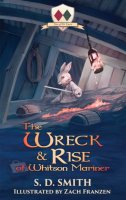
The Wreck and Rise of Whitson Mariner by S. D. Smith (Story Warren Books, 2018)
My place beside you, my blood for yours,
Till the Green Ember rises, or the end of the world!
I cannot resist a new Green Ember book, and while we are waiting for a continuation of the main series, S. D. Smith has provided an appetizer in the form of a sequel to the prequel. Of The Black Star of Kingston, I wrote, "It's a distant-past prequel to The Green Ember, and definitely enjoyable to read in its own right. It's not quite as satisfying, mainly because it's much shorter, but also because the strong female characters are mostly missing. Perhaps even rabbit civilizations need to develop over time."
Much the same could be said about The Wreck and Rise of Whitson Mariner. As an appetizer, it is small, and lacks the depth and nuance of a full meal. It's also primarily about battles, the kind that tend to appeal more to a young, male audience. While reading, I couldn't help seeing a juvenile version of the car chases and gun battles in NCIS: Los Angeles. Or, if you prefer a more classical analogy, the battle descriptions in The Iliad. That aside, it's a fun story, and not lacking in the examples of courage, love, and sacrifice I've come to expect from S. D. Smith. Plus, even though the men get most of the action, the women get some exciting parts, too, and come out better than in the previous story—if not as well as in the later Green Ember books.
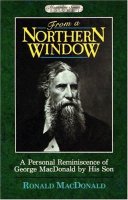
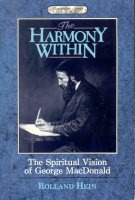

The Masterline Series of studies on George MacDonald, edited by Michael Phillips (Sunrise Books, 1989)
Volume 1: From a Northern Window: A Personal Reminiscence of George MacDonald by His Son by Ronald MacDonald
Volume 2: The Harmony Within: The Spiritual Vision of George MacDonald by Rolland Hein
Volume 3: George MacDonald's Fiction: A Twentieth-Century View by Richard Reis
The first book is an interesting look at George MacDonald through the eyes of one of his sons. It was definitely worth reading, though not sufficiently well-written to encourage me to anticipate reading it again.
The other two are another story; I found them dust-and-ashes. Not dry, as in pedantic or overly academic, but of almost no value to me. And not for obvious reasons.
Both these authors have a good deal of respect for MacDonald and are fulsome in their praise of some of his works, so my active dislike of their books is not because they abuse one of my all-time favorite authors. C. S. Lewis, whose praise of MacDonald is as high as one person can give to another, acknowledges that while some of his works are unsurpassed, many others are clearly mediocre. As far as I can tell his points are valid, so the fact that these authors say the same thing can't be the sole reason I find their works unprofitable. I have to say, though, that some of what the literary world finds of no value I think is great. MacDonald was a preacher, and the fact that his philosophical ideas come through in his books is a plus for me. Not to mention that, unlike the literary world, I like happy endings and characters who are "too good to be true."
Partly, I'm sure, my dislike of these books is because they are in the genre of literary criticism, and the process of pulling apart a book to see what it is made of is distasteful to me. (Michael Ward's Planet Narnia is the only exception that comes to mind.) I've always been a voracious reader and it's obvious how much I now enjoy writing, but I hated English class at every level of school, and the process of taking apart a good (or bad) story, and guessing at what the author "really" meant, was largely responsible for that. I especially resent the apparent need to find "obvious" sexual meanings embedded in otherwise lovely and as far as I can tell innocent stories—which both Hein and Reis do. Possibly MacDonald meant the sexual references—he was a man, and as a gender men do have some extraordinary ideas about sex, plus he had eleven children—but I'm skeptical.
That aside, I did pull out a few quotes I wanted to remember:
These are from Ronald MacDonald's From a Northern Window.
After his abandonment of the predicant profession, he never took remuneration for a spoken sermon; and never, I am sure, refused his preaching, from whatever Christian denomination the invitation might come. I remember very well his saying that the Unitarians were among the most instant to get him to preach; and that he always stipulated for liberty to maintain the doctrine of the Trinity; by which orthodoxy I do not think he ever gained a Sunday's rest. (p. 35)
His own family of eleven children, whatever the narrowness of accommodation or banking-account, seemed never enough to keep the house comfortably full. During his lecturing tour in the United States, in 1872-3, it was widely reported that he was father of thirteen children—a mistake proved to be due to his frequent statement that he had "the wrong side of a dozen." (p. 50)
These from The Harmony Within by Rolland Hein.
MacDonald felt deeply that the great possibility for mankind is to grow into complete godlikeness, so that men shall be one with God. This does not mean that men shall be absorbed into God, as more pantheistic systems hold; rather, as men mature into moral and spiritual perfection, they develop at the same time a more distinct individuality. ... MacDonald's vision is one of an innumerable multitude of redeemed individuals with a final unity of will and spirit. (p. 30)
God made each man unique, MacDonald insists, and God intends that each maintain his uniqueness, that he might serve and worship the Lord in a way no one else can. The result is that each man both learns and teaches something of God in his relations with his neighbors. (p. 68)
And these are from George MacDonald's Fiction by Richard Reis.
More interesting ... are MacDonald's views on God's self-expression in nature. "This world is not merely a thing which God hath made, subjecting it to laws; but it is an expression of the thought, the feeling, the heart of God himself." "Nature is brimful of symbolic and analogical parallels to the goings and comings, the growth and changes of the highest nature in man." "The faces of some flowers lead me back to the heart of God; and, as his child, I hope I feel, in my lowly degree, what he felt when, brooding over them, he said 'They are good'; that is, 'They are what I mean.'" "There is not a form that lives in the world, but is a window cloven through the blank darkness of nothingness, to let us look into the heart, and feeling, and nature of God." (p. 38)
I shall not discus at much length MacDonald's theories about the interpretation of Christ's words in the New Testament, because his views are essentially those of every other interpreter—that Jesus taught precisely what the interpreter believed all along. (p. 37)
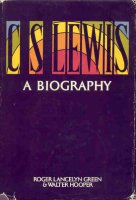 C. S. Lewis: A Biography by Roger Lancelyn Green and Walter Hooper (Harcourt Brace Jovanovich, 1974)
C. S. Lewis: A Biography by Roger Lancelyn Green and Walter Hooper (Harcourt Brace Jovanovich, 1974)
I'm already convinced I made the right decision to begin my C. S. Lewis "retrospective" with biography. Learning about an author's personal life may not be the best introduction to his works, but when I'm facing a list of nearly 50 books that range from those I haven't yet read (e.g. The Discarded Image) to those I've read literally dozens of times (e.g. the Narnia books), it's probably a good idea to remind myself of the man behind the words.
I can recommend this biography without qualification, even though there were one or two spots that annoyed me, such as when the authors accuse Lewis of exaggerating the horrors of one of his childhood schools. "Oh, come on; it isn't that bad" are harsh words for a sufferer to bear. Lewis was safely dead ten years before the book was published, but I'm sure he heard similar comments in his lifetime.
What struck me most about Lewis this time was how brilliant he really was, from his earliest days. The sheer volume of his reading is phenomenal, and it seems he forgot nothing. He read adult books as a child and children's books as an adult, enjoying them strictly on their merits. He suffered greatly in the normal British educational system, but absolutely thrived in his two and a half years, beginning at age 14, with a private tutor (William T. Kirkpatrick) who would have terrified most children. "Some boys would not have liked it [but] to me it was red beef and strong beer."
"If ever a man came near to being a purely logical entity, that man was Kirk*", Lewis decided, and his own acutely logical mind was to a great extent formed and sharpened by Kirkpatrick's. Kirkpatrick's outstanding conviction was that language was given to man solely for the purpose of communicating or discovering truth. The general banalities and "small-talk" of most people did not enter into his calculations. "The most casual remark was taken as a summons to disputation." To a mere "torrent of verbiage" he would cry "Stop!", not from impatience, but because it was leading nowhere. More sensible observations might be interrupted by "Excuse!", ushering in some parenthetical comment. Full approval would be encouraged by "I hear you"—but usually followed by refutation: "Had I read this? Had I studied that? Had I any statistical evidence? And so to the almost inevitable conclusion: 'Do you not see then that you had no right...' "
Lewis arrived ... on Saturday, 19 September 1914, and two days later he was flung straight into Homer, of whom he had never read a word, nor had any introduction to the Epic dialect, having only studied the straight Attic of Xenophon and the dramatists. Kirkpatrick's method was to read aloud twenty lines or so of the Greek, translate, with a few comments and explanations for another hundred lines, and then leave his pupil to go over it with the aid of a lexicon, and make sense of as much of it as he could. It worked with Lewis, who had no difficulty in memorizing every word as he looked up its meaning. Kirkpatrick at this stage seemed to value speed more than absolute accuracy, and Lewis soon found himself understanding what he read without translating it, beginning to think in Greek.
Of Lewis, his tutor said,
He was born with the literary temperament and we have to face that fact with all it implies. This is not a case of early precocity showing itself in rapid assimilation of knowledge and followed by subsequent indifference or torpor. ... It is the maturity and originality of his literary judgements which is so unusual and surprising. By an unerring instinct he detects first rate quality in literary workmanship, and the second rate does not interest him in any way. ... [He] has a sort of genius for translating. ... He has read more classics in the time than any boy I ever had, and that too very carefully and exactly. In Homer his achievement is unique. ... In the Sophoclean drama, which attains a high level in poetic expression ... he could beat me easily in the happy choice of words and phrases. ... He is the most brilliant translator of Greek plays I have ever met.
With that as background, consider how near Lewis and Oxford University—with which he had fallen in love at first sight—came to missing out on each other. Without trying to understand and explain the British university system, I can boil it down to this: Lewis was accepted to Oxford pending the successful completion of a particular examination. In this, the brilliant student failed the mathematics portion. He was admitted anyway, because he had volunteered for Army service (World War I) and he went through the Officers' Training Corps there. The theory was that he would be working on algebra (his downfall) as he could and would re-take the exam after his service ended. He tried, but never mastered the subject well enough to pass the exam. Fortunately for all of us, after the war veterans were specifically exempted from the need to pass that exam. "Otherwise," Lewis observed, "I should have had to abandon the idea of going to Oxford."
I shudder at the close call, and while I have difficulty fathoming the idea that someone so intelligent, skillful, and hard-working could fail to understand algebra, I offer this story as encouragement to those who may find themselves struggling now that so many high schools have made the subject a requirement for graduation. You can be brilliant and successful without algebra! I just hope you don't have to fight a war to get where you want to go, and that you will be able to afford an assistant to help you with the math of daily life. Algebra was not Lewis's only problem: He never managed to grasp the difference between gross and net profit when it came to his book sales, and had to be saved from dire financial straits by friends who set up a system whereby he could be exceedingly generous to others without going bankrupt himself.
If you are new to the works of C. S. Lewis, his own writings are the place to start. I would suggest beginning with either the Narnia books or Mere Christianity, depending on your temperament. But if you're interested in learning more about the brilliant, complex, surprising person behind all the books, Green & Hooper's book is a good bet.
*Some would say Spock, not Kirk, but that's another story.
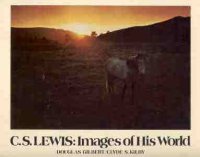 C. S. Lewis: Images of His World by Douglas Gilbert and Clyde S. Kilby (Eerdmans, 1973)
C. S. Lewis: Images of His World by Douglas Gilbert and Clyde S. Kilby (Eerdmans, 1973)
This book of photos—places, people, manuscripts—from the world of Clive Staples Lewis was a gift from Porter eons ago, probably not many years after its publication. I read it then, of course, and just re-read it as part of my newest reading project: binge-reading all the books in our home library by or about a particular author. I have previously tackled George MacDonald, J. R. R. Tolkien, William Shakespeare (plays only, read or viewed), and Miss Read (Dora Jesse Saint). Since the C. S. Lewis collection is exceeded only by our George MacDonald books, this is no small project.
Often I read the books in publication order, because I think that gives insight in to an author's growth and development. I'll do some of that with Lewis, but I thought I'd start with a biography, and this book seemed good to read even before that ("Book 0"), to give context to what I will be reading. It was a good choice.
It's largely a picture book, no surprise, so there's not a lot to quote from, but there were two I couldn't resist marking.
In spite of his academic success [at Malvern College], Lewis wrote home in March 1914, imploring his father to take him away. His brother Warren commented: "Much to my surprise, my father reacted to this letter by making an immediate and sensible decision. Jack was to leave Malvern at the end of the school year.... The fact is that he should never have been sent to a public school at all. Already, at fourteen, his intelligence was such that he would have fitted in better among undergraduates than among school boys; and by his temperament he was bound to be a misfit, a heretic, an object of suspicion within the collective-minded, and standardising, Public School system."
Granted, what the Brits mean by "public school" is not the American version, but the point about how school life treats those who don't fit in—especially if they are particularly intelligent—is still the same. It is worth noting that Warren himself was very happy at Malvern, yet he also said (taken from another source), "He was, indeed, lucky to leave Malvern before the power of this system had done him any lasting damage."
After almost 30 years as a professor of English Language and Literature at Magdalen College of Oxford University, Lewis became Chair of Medieval and Renaissance English at Magdalene College, Cambridge.
I think I shall like Magdalene better than Magdalen. It's a tiny college (a perfect cameo architecturally) and they're all so old fashioned, and pious, and gentle and conservative—unlike this leftist, atheist, cynical, hard-boiled, huge Magdalen. Perhaps from being the fogey and "old woman" here I shall become the enfant terrible there.
I can identify with that. Put me with liberals, and my conservative side predominates. Put me with conservatives, and my liberal side comes to the fore. Always the troublemaker.
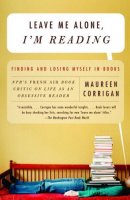 Leave Me Alone, I'm Reading: Finding and Losing Myself in Books by Maureen Corrigan (Vintage Books/Random House, 2005)
Leave Me Alone, I'm Reading: Finding and Losing Myself in Books by Maureen Corrigan (Vintage Books/Random House, 2005)
For a book with such a promising title, there was surprisingly little I could identify with here. I was expecting something lighthearted about introverts, but it's much more personal and introspective and has nothing to do with introverts, per se. The author is a self-professed leftist, feminist college professor who reviews books for NPR's Fresh Air show and is "ambivalent about the constraints of family and community." In other words, other than a love of books, we don't have a lot in common. That doesn't mean her book can't be interesting, but it was depressing, and if I want that, I can go to Facebook.
Given all the books Corrigan has read, and all the books I've read (though I can't hold a candle to her consumption), we have surprisingly little intersection. Before starting the book I skimmed the recommended reading list in the back, and most of the books I've never heard of, let alone read. However, a (very) few items on the list had the merit of not only being books I love, but ones that most other people I know don't share with me: Dorothy Sayers' Gaudy Night and The Nine Tailors, and Marie Killilea's Karen and With Love from Karen. That's about it. What kept me going past the first chapter, which I did not like at all, was my eagerness to see what she thought of these favorites of mine.
As it turns out, we may have read (and loved!) the same books, but we sure didn't read them the same way. Truly, what one gets out of a book depends much on what one brings to the experience. Reading Leave Me Alone, I'm Reading was a vivid reminder of why I hated English class in high school, and why I majored in math in college. Maybe the authors did mean all the weird things that literature teachers pull out of their stories, but if so, I don't really want to know about it. (The only exception I can think of is Michael Ward's Planet Narnia, which I'm fairly certain Corrigan has not read.)
Still, a few quotes stand out.
I learned ... about the void that all devoted readers dread—the void that yawns just past the last page of whatever good book we're currently reading.
With this, I identify completely. I usually start planning my next book before finishing the current one.
More puzzling still is the mystery of what happened to Kingsley Amis himself after writing his masterpiece. Amis transformed from an Angry Young Man to a club-going, Merrie Olde England Tory bag of wind. How can such things be? Similar invastion-of-the-body-snatchers-type conversions besmirch literary history: the defection of New York Intellectual Norman Podhoretz to the right; the mutation of progressive reporter Joe Klein, who had written a moving boigraphy of Woody Guthrie, no less, into a centrist pundit and author of the anonymous Clinton parodic novel Primary Colors. Why? Why? Why? If reading good books doesn't necessariy make you a better person, apparently neither does writing them.
There's only so much of that I can stand. This is the same attitude that cost Hillary Clinton the election. Even if you really do think of half your potential audience as Deplorables, it's rarely good policy to say so out loud.
One of the great pleasures of writing book reviews is that I get to say what I think when I also have the time and space to say it right. Nobody interrupts or intimidates—it's just me and my computer. But I'm much more comfortable voicing my opinions, especially the controversial ones, in print than in person.
Me, too on that one.
Corrigan, who calls herself a "skeptical Catholic"—I would say very skeptical, and that her Catholicism owes more to culture than to belief—finally marries, despite some ambivalence.
It now seems quaint, but one of the big obstacles to matrimony ... was that Rich is an atheist Jew and I am a Catholic, sort of. My parents were upset. ... Richard's parents were also unhappy.
It seems "quaint" to Corrigan that her parents were worried about a marriage starting out with the two parties in disagreement on the very basic bedrock of truth? Despite their different labels, apparently they do agree: on the idea that the truth about the nature of the universe matters a lot less than the fact that they both value books and solitude. But that sort of tolerance is no excuse for thinking you're a liberal, progressive person, enlightened and open-minded—it just means you don't care much about the issue. I'm certain Corrigan would not have married a Republican, because that represents a difference that matters to her.
In the opening scene, a scruffy bunch of Irish Catholics, family and friends, are sitting around a restaurant in Queens. Every time the waitress comes by to fill their water glasses or put down a plate, people at the table quickly say "Thank you." I find myself doing that, too—scrupulously thanking anyone in a restaurant or store who's serving me. It's a holdover from the world of my childhood where we were taught to feel gratitude for any service done for us—and where all the parents we knew held down blue- or pink-collar jobs, so there was no sense of superiority to someone working as, say, a waitress. These days, I sit at too many restaurant tables with people oozing privilege who barely acknowledge the waitperson.
No. This is not a "class" difference. My father was an engineer and my mother a mathematician, and we also were taught to feel (and express) gratitude for service done. Not that we had much chance of trying it out on waitresses, since eating out was not in the budget except on vacation and not often even then. But the lesson was clear, by precept and example, and I still say "thank you" when the waiter fills my water glass or brings my dinner. Common courtesy is not a mark of lower class subservience, and its lack is not "privilege"—it's just rudeness.
Literature doesn't work on readers in predictable ways. Sometimes we readers put up with views we don't like in a novel or any other kind of art in exchange for other compensations.
Indeed. If I rejected every book with what I see as serious flaws, my reading list would be mighty short. But even though I don't regret reading it, Leave Me Alone, I'm Reading did not provide sufficient compensation to justify its continuing to take up bookshelf space.
Except for the title: that's a keeper.
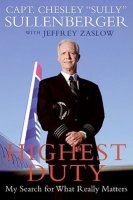 Highest Duty: My Search for What Really Matters, by Chesley "Sully" Sullenberger with Jeffrey Zaslow (William Morrow/HarperCollins, 2009)
Highest Duty: My Search for What Really Matters, by Chesley "Sully" Sullenberger with Jeffrey Zaslow (William Morrow/HarperCollins, 2009)
It's not often I like a movie better than the book it's based on (The Martian is the only one that comes immediately to mind), but in many ways that's true of the story of Captain Sullenberger's amazing landing of USAirways' Flight 1549 on the Hudson River. Sully, the movie, shows excellence of craftsmanship that's lacking in the book. Not surprising—Sullenberger is a pilot, not a writer. Nonetheless, Highest Duty is well worth reading and contains much important information not relevant to (and therefore not included in) the movie.
January 15, 2009. It's hard to realize how unconnected we were back then. We were caught up in our own lives—having just returned from our daughter's wedding in Switzerland—and I missed the event completely; at least, I have no memory of it. We owned a television set, but it was rarely turned on, and we were much more likely to be listening to CD's than to the radio. Porter was on the road, in Arizona I think, and while I'm sure he was aware of the incident, it didn't make the list of important topics to cover in our daily phone call. Today, I'm still pretty unconnected to news when it comes from television or radio, but if anything big happens, I can count on my friends on Facebook to start talking about it, and plenty of internet sources to flesh out their stories. I can (and frequently do) ignore the stories that are currently causing the world to buzz, but I can't miss them.
What I enjoyed most about Captain Sullenberger's story were the glimpses into what makes it possible for me to walk onto an airplane in one city and walk off, a few hours later, in another. These are woven in and out through the book, and the picture that emerges is both awe-inspiring and frightening. I've always felt safer in a plane than in a car, and statistically that's correct. Still, without feeling any less unsafe in a car, I'm a little more nervous about air travel than I was before reading Highest Duty.
People have incredibly high expectations for airline travel, and they should. But they don't always put the risks in perspective. Consider that more than thirty-seven thousand people died in auto accidents in the United States last year. That was about seven hundred a week, yet we never heard about most of those fatalities because they happened one or two at a time. Now imagine if seven hundred people were dying every week in airline accidents; the equivalent of a commercial jet crashing almost every day. The airports would be shut down and every airliner would be grounded.
Sullenberger is no complainer, and this is not the focus of his book. But the picture that emerges is of an airline industry in trouble, and I don't think it's gotten much better since 2009. He blames a lot on airline deregulation, but as I wrote in my previous post, the negative changes that have come to the airline industry are widespread throughout most industries and organizations. Some changes are technological, and many are societal.
A lot of people in the airline industry, and especially at my airline, US Airways, feel beaten down by circumstance. We've been hit by an economic tsunami. Some people feel their companies have held a gun to their heads, demanding concessions. We've been through pay cuts, givebacks, downsizing, layoffs. We're the working wounded.
People get tired of constantly fighting the same battles over and over again every day. The gate agent hasn't pulled the jetway up to the plane in time. The skycap is supposed to bring the wheelchair and hasn't. (I've helped more than a few older people into wheelchairs and pushed them into the terminal myself.) The caterer hasn't brought all the first-class meals. Catering companies always seem to be the lowest bidders with the highest employee turnover. At the end of a long day, you and your crew will get off the plane and make your way out of the terminal, but the hotel van isn't there when it's supposed to be.
All of this stuff beats you down. You get tired of constantly trying to correct what you corrected yesterday.
Many pilots and other airline workers feel that if they keep picking up all the slack, those who run the companies we work for will never staff the airlines properly, or do the training necessary, or hire the contractor who will be more responsible about bringing wheelchairs. And my Colleagues are right about that. In the cultures of some companies, management depends heavily on the innate goodness and professionalism of its employees to constantly compensate for systemic deficiencies, chronic understaffing, and substandard subcontractors.
At all airlines, there are many employees, including in management, who care deeply and try to make things better. But at some point, it can feel like a fine line between letting passengers fend for themselves and enabling the airline's inadequacies.
In my parents' generation, there was an unspoken agreement between big companies and their employees, at least at the level at which my father and his friends worked (somewhere between union workers and management): the employees would be hard-working and loyal, and the company would provide a decent salary, good benefits, a reasonable amount of job security, and a pension one could live on after retirement. That changed for my generation, and if the next generation seems deficient in the hard-work-and-loyalty department, it is good to remember that in their formative years many of them saw that the reward for such behavior looked an awful lot like betrayal.
It's fashionable to disparage "Millennials," by which most people seem to mean not people born between two specific years, but "the current crop of lazy young adults with no ambition, few skills, and a pathetic work ethic." Interestingly, the glimpse I have into the lives of actual people who would otherwise fit into that demographic shows them to be among the hardest-working and most dependable people I know, with very admirable skill sets. It is as if they are trying to make up for those who give the generation a bad name. And the bad apples do exist in high numbers, at least if my conversations with employers and teachers are accurate.
One young employee approached an evaluation convinced that she deserved a raise. When asked why, she responded not with a list of her accomplishments for the company, but with the assertion that she showed up for work every day. Which may be less astonishing than it sounds, given that her boss's complaint about the girl's co-workers was that they didn't show up much of the time.
Apparently the National Guard is authorized to send the police after its recruits that don't show up when expected. But in one town I heard about the Guard is trying to find another approach, since there aren't enough police to deal with the large numbers of no-shows.
Do you want someone with so little sense of responsibility sitting in the pilot's seat on your next flight?
Then there's the matter of experience. It is clear that what enabled Captain Sullenberger to take the actions that saved the life of every single person on board his airplane was a lifetime's worth of intense aviation experience. The older generation of pilots often had military backgrounds, and had put in an enormous number of flight hours before becoming commercial pilots. This included extensive training designed to hone their responses to dangerous, emergency situations. Military pilots still often transition to commercial piloting—I know a Southwest pilot who did just that—but with military cutbacks, civilian flight training is becoming more common, and pilots are graduating with many fewer hours of experience under their belts. Plus, I'm certain they don't get the kind of emergency experience the military pilots do: such training is dangerous—some pilots always die. The risk is necessary for the military, but can a civilian organization take those chances?
Technology, and the availability of simulators for training can probably do a lot to mitigate the situation. There is no substitute for real-life experience, but maybe pilots will do as well—or better—with a percentage of the hours done in the new forms of training. And automation can reduce some pilot error; we're told that in most situations driverless cars make better decisions than live drivers do. On the other hand, there are those other situations—the kind that leave you choosing to land in the middle of a river.
Automated airplanes with the highest technologies do not eliminate errors. They change the nature of the errors that are made. For example, in terms of navigational errors, automation enables pilots to make huge navigation errors very precisely.
Me? I'm not about to stop flying, but I'll do it with more respect and appreciation for those who make it possible. And I'm counting on those ambitious, talented, hard-working, and enthusiastic Millennials that I know are out there to continue to pick up the slack and do the right things. And then move into management and do the right things there, too.
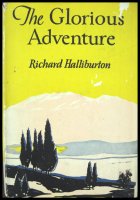
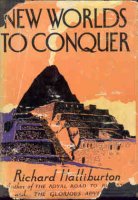 The Glorious Adventure by Richard Halliburton (Garden City Publishing, 1927)
The Glorious Adventure by Richard Halliburton (Garden City Publishing, 1927)
New Worlds to Conquer by Richard Halliburton (Garden City Publishing, 1929)
Last year I reviewed Richard Halliburton's The Royal Road to Romance. I read The Glorious Adventure soon thereafter, and finished New Worlds to Conquer just now.
In The Glorious Adventure, Halliburton describes his efforts to recreate The Odyssey, following the trail of Homer's hero, Ulysses. New Worlds to Conquer is set in Latin America, from Mexico to Argentina, and is my favorite of the three, probably because it is the only one I remember reading as a child. I'm not good at remembering the content of books that I've read, and the rest of New Worlds was foreign to me on re-reading, but I've never forgotten that Halliburton swam the Panama Canal from one ocean to the other, including through all the locks. I particularly remembered that when asked how he proposed to meet the lock fees, he replied, "Just as the other ships meet it, sir. I'd pay according to my tonnage." It cost him thirty-six cents.
There is an inscription in New Worlds to Conquer indicating that it was a gift to my father from his parents. I wonder how young he was when he received it; he was eight years old when it was published.
What I wrote about The Royal Road to Romance is equally true here.
Halliburton's life is not one to be emulated—he died at 39 attempting to cross the Pacific in a Chinese junk—and his stories have a light-hearted amorality about them that can be a little disconcerting, as can the racial attitudes and language of the time. But understood in context, I think this would be a good book for older grandchildren.
There is a good deal of history, geography, and literature woven throughout Halliburton's books, but the educational value does not detract; indeed, it adds much to the adventures. And adventures they are. Halliburton is a poster child for what can be accomplished through guts and gall. A man who doesn't hesitate to throw himself 70 feet into the Mayan Well of Death at Chichen Itza—twice—and voluntarily gets himself incarcerated with France's most notorious prisoners in its even more notorious prisons off the coast of French Guiana, is not likely to live a long life. Halliburton lived only four years longer than Mozart, but like the composer, his accomplishments in those years were prodigious.
I wonder what the Richard Halliburtons of today are doing? The world was looser back when he had his adventures. From Angkor Wat to Machu Picchu, he climbed all over the wonders of the world, and experienced them in solitude. Now there are fences, and guards, and rules—and a very good thing, too, given the hordes of tourists who now descend. But the discovery of Machu Picchu was less than 20 years old when Halliburton visited, and very few tourists would go through what he did to get there.
A careless disregard for personal safety, a rejection of traditional responsibilities, a burning internal drive, and a charming personality can be a recipe for a totally selfish life. But timid folks like me are awed by how much such boldness can achieve.
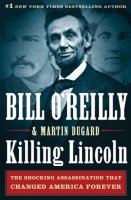
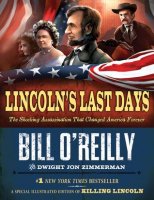
Killing Lincoln: The Shocking Assassination That Changed America Forever by Bill O'Reilly and Martin Dugard
Lincoln's Last Days: The Shocking Assassination That Changed America Forever by Bill O'Reilly and Dwight Jon Zimmerman
Six years is a long time to hold a debt, and I consider a gift book unread to be a debt unpaid. But my father-in-law, who so kindly gave us both of these books for Christmas 2012, is not alone among our creditors. Most Americans have credit card debt; I have bookshelf debt. These shelves in my office are only representative, by no means comprehensive. But I plow on, one book at a time.
Or in this case, two books. Lincoln's Last Days is really a much-shortened version of Killing Lincoln, with the addition of many illustrations. To me, this makes Killing Lincoln the far more interesting book. With apologies to the world's illustrators, I rarely appreciate their work. Pictures are great in their place, but to my mind their place is rarely to be cluttering up a book. They annoy me by interrupting the flow of the words, and by breeding conflict: I want to keep reading — I really ought to look at the pictures — but they always break my train of thought — if I skip the pictures can I really say I've read the whole book? — does it count if I give them a cursory glance? — ugh. I often don't even look at the illustrations in children's picture books when I read them to our grandchildren, another reason I dislike the modern trend of not including the whole story in the words alone. You can guess how I feel about those books that don't have any words at all!
But this isn't about my quirks. And I'll admit that the shortened, illustrated version was a good gateway book for me. I'm not above letting prejudice affect my actions, and I had an unreasoned, gut-level prejudice against Bill O'Reilly. I say unreasoned because I knew nothing about him, had never seen him, had never heard him except accidentally in the background. But what I had soaked in from the world around me was negative. And I had noticed that he seems to have a predilection for writing about killing people: Killing Lincoln, Killing Patton, Killing Reagan, Killing Kennedy, Killing Jesus, Killing England, etc. Which left me with a bad taste in my mouth for reading anything of his. Okay, maybe this really is about my quirks.
However, since 2009, when I wrote Finding Truth in Unexpected Places, I have encountered more examples than I can count of my (then) newly-made proverb, the wise man recognizes truth in the words of his enemies. Not that Bill O'Reilly is my enemy, but you get the idea.
Much to my surprise, I greatly enjoyed both books.
Perhaps someone who knows more about Abraham Lincoln and the Civil War would not be as impressed, but I learned a lot. What's more, the stories are well-written and gripping and I found it hard to put the books down, even though I knew how they turned out. There are a few minor annoyances, such as some of the physical descriptions, e.g. "Laura Keene steps aside. She can't help but marvel at Lincoln's upper body, still possessing the lean musculature of the young wrestler renowned for feats of strength." This, while Lincoln was dying in her presence? Was that really necessary? Not to mention the use of "can't help but," a pet peeve of mine.
If you want to feel good about human nature, this might not be what you're looking for. We don't seem to have progressed much from the mid-19th century, when people celebrated by drinking and rioting, mourned by drinking and rioting, and protested by drinking and rioting; when the nation's leaders thought it reasonable to violate the Constitution in the name of security; and when the American people discarded justice—let alone compassion—in favor of vengeance.
There is a lot of interesting detail here, and the books appear to have been well-researched; don't expect much nuance, however. If you have any thought that the Civil War was about more than just slavery, or that Abraham Lincoln was not a saint in every possible way, Bill O'Reilly is not your man. But nuance comes best from reading many sources (or watching—Ken Burns' PBS Civil War series is excellent), and these well-told stories deserve a place in that collection. I highly recommend reading either book, but especially Killing Lincoln. It would be appropriate—and easy reading—for my two oldest grandchildren.
I notice that our local library has many of O'Reilly's other books. Despite my initial prejudices, I'm inclined to check out some of the other people he has "killed." This is another reason why the unread books on our shelves are slow to change their status.
 American Terroir: Savoring the Flavors of Our Woods, Water, and Fields by Rowan Jacobsen (Bloomsbury, 2010)
American Terroir: Savoring the Flavors of Our Woods, Water, and Fields by Rowan Jacobsen (Bloomsbury, 2010)
Score one more for my sister-in-law's library book sale sense, though why the public library in Simsbury, Connecticut saw fit to discard this excellent book is unfathomable. The author of the Fruitless Fall and Chocolate Unwrapped has produced another beautiful book about food, reminiscent of both John McPhee's Oranges and Michael Pollan's Cooked.
My generation grew up on standardized food. Living in Upstate New York, I knew that apple cider was a living drink of complex and unmatched flavor, bearing zero resemblance to the apple juice on grocery store shelves. I knew that the flavors in the blueberries I picked from a friend's farm were so far from those available in the mass market that they ought not to be sharing the same name. It was years, however, before I realized that the same was true of milk, orange juice, bread, oil, lettuce, and other dietary staples. We have not entirely sold our birthright for a mess of pottage—making inexpensive foods available to those who live away from the source is a good thing—but the loss of flavor and variety may bear some responsibility for the rise of obesity: we are eating more and enjoying it less.
Searching for the role of place—soil, climate, altitude, farming practices, and other environmental factors—on iconic North American foods, Jacobsen's essays cover maple syrup, coffee, apples and apple cider, honey, potatoes, mussels, wild forest foods, oysters, avocados, salmon, wines, cheese, and chocolate.
American Terroir is good all through, but the first sip was the best: the chapter on maple syrup.
Anybody can make the late-season treacle, but pulling off a batch of super-delicate Fancy requires skill, experience, and luck. You have to use the first sap runs of the year, which are higher in sugar content and thus require less boiling, because the longer you boil syrup, the darker it gets. And you have to boil right away, because if sap sits, microorganisms flourish in it, and these "impurities" are what make the syrup dark and strong....
Of course, nobody really cares except the handful of remaining maple sugar manufacturers and the old-time New Englanders who continue to go to great lengths to keep flavor out of their syrup. Until recently, they even charged more for it—a really bizarre situation, since most everyone who didn't grow up in a sugaring family prefers the rich, chewy, darker grades....
Fancy is the color of vegetable oil, Medium Amber the color of honey, Dark Amber the color of Amontillado sherry, and B the color of iced tea. Commercial, which has the color and flavor of motor oil, can't be sold retail and is shipped by the barrel to the packaged-food industry for products "made with real Vermont maple syrup."
The chapter on apples is fascinating, but also disappointing. Jacobsen correctly makes the point that pasteurization and the loss of heirloom apple varieties have ruined what the grocery stores call "apple cider," but he errs in insisting that the only brew worthy of that name is alcoholic. Of the apple's ambrosial nectar—cider that is unpasteurized, unfiltered, and made from small, old-fashioned apples with unfamiliar names—he makes no mention at all.
Reading what Jacobsen learned about coffee almost made me want to start drinking the stuff. Reading about wine, on the other hand, nearly had me taking the pledge.
Few wines make it through the chop shop untouched. Yet none of this is revealed by the label. Wine is not, according to the U.S. government, a food, so the Food and Drug Administration has no jurisdiction over it. The Alcohol and Tobacco Tax and Trade Bureau, which has never been big on ingredients lists, does. The only thing a wine label need reveal is the presence of sulfites, which are added to all but organic wines....
Here's the label I'd really like to see: "At Wacky Wallaby Wines, our lifeblood is selling wines in the United States at 5.99 a bottle. A couple of years ago we tried raising our price to $6.99, but we lost market share to Chile, so $5.99 it is. To survive at that price point, we scour Australia for the cheapest grapes we can find, and we buy them in massive quantities, which allows us to really shaft the growers for every nickel. All those grapes come from vineyards that maximize yield, meaning there isn't a whole lot in them other than sugar and water. Unsurprisingly, these grapes tend to make wine that tastes like Hi-C with grain alcohol sprinkled over the top. But here's where we at Wacky Wallaby go the extra mile so that you, the consumer, can have drinkable wine for the price of a Double Whopper meal deal. We start by dusting the juice with powdered acid, the better to approximate the fresh juiciness of Hi-C, plus a quick shot of Ultra Red to give it the inky blackness that usually only comes from low-yielding, expensive vines. Next we order a yeast, developed in Australia's finest lab, that gives the aromas of jam and chocolate to red wines. (Taste tests have shown that you, the consumer, really, really like anything that tastes like chocolate.) We use sulfites to kill any indigenous yeasts in the juice (indigenous yeasts can be so unpredictable), then add the choco-yeast and ferment the juice. The resulting wine is wildly alcoholic because the sugar content of the grapes is so high (hey, that's what happens when you grow vines in a dessert!), so we throw it in the ol' reverse-ossy [reverse osmosis] and remove enough alcohol to drop it to a drinkable 14 percent. We could go further, but you, the consumer, have shown that you like to get hammered. Independent studies have also shown that you actually prefer the taste of Hi-C to that of wine, so our next move is to push the flavor profile in that direction. To soften that rough, tannic taste of red wine skins, we micro-oxygenate. The same thing would happen naturally if we stuck the wine in our cellar and let it age for six years, but we at Wacky Wallaby have to service our debt long before then, so micro-oxygenate it is. Next, we shovel mountains of wood chips into the vat to give a vanilla flavor. And you, the consumer, have shown that the only flavor you like even more than chocolate is vanilla. You like it in everything, and, much to even our shock, you like more than we ever could have imagined. So on those rare occasions when we suffer an attack of standards and consider stopping, we remind ourselves that wineries are going under right and left, and we start shoveling wood chips again. Our commitment to you, the consumer, is that we will follow you to the vanilla-candle-scented ends of the earth if it makes you happy!"
Maybe I won't take the pledge after all. On another front, the Prohibitionists have a lot to answer for.
From a riotous diversity of form, color, and flavor, reflecting the multitude of ends we asked the apple to meet—food, dessert, refreshing drink, inebriator—the apple tree suffered a biodiversity crash in the nineteenth century, brought down by the temperance movement. The campaign to chop down every cider tree drove cider underground and impoverished the drink in a way it is only now recovering from. The apples that survived the purge were the ones that could legitimately claim to be for eating, not drinking. Most of the tannic, astringent apples disappeared, replaced by apples with abundant sugars and enough acid to keep things interesting.
American consumers are not without fault.
It turns out that, given a choice, people overwhelmingly go for the reddest apples. So growers kept selecting for the reddest. They were not, however, selecting for the tastiest. Eventually, Red Delicious apples eclipsed fire-engine red and reached a color imaginatively described by the industry as "midnight red." And most are virtually inedible, with dry flesh and thick skin. Good-tasting apples have small, tightly packed cells that break apart at first bite, spilling their juice in all directions. Red Delicious have cottony, dry cells with too much air in between. This has not been lost on the industry, but until recently, it didn't care. The mealiest Red Delicious outsold the tastiest McIntosh. Why not give the people what they want?
Did you know this?
Today China dominates the apple business, with more than 60 percent of world production. The second-place United States is a speck in China's rearview mirror, with 6 percent, two thirds of which comes from Eastern Washington.
I had the sense to birth Heather during apple season; why is it that her family celebrates half of their birthdays in February? We seem to have developed a pattern of visiting New Hampshire in either the hottest part of the summer or the coldest part of the winter. It's high time we broke the pattern, because New Hampshire has some of the most wonderful apples ever, no matter what Eastern Washington might think.
For my taste, American Terroir's finish is not as strong as its beginning, probably because he is unkind to dark chocolate. That's a pattern throughout the book: the best and most interesting flavors are found in the lighter versions of food: Fancy grade maple syrup, lightly roasted coffee, and chocolate without the compounds that give dark chocolate its signature flavor (and its health benefits).
Two other patterns stand out, repeated over foods as diverse as the book:
- Consistently, the best-tasking food is produced under stress. Altitude, temperature, climate—an easy life leads to bland fruit. Struggle produces character. What doesn't kill you makes you—or at least your children—interesting.
- Yuppies, rich people, capitalists, and food snobs: we love to hate 'em. But it is their tastes, their interest, their efforts, and their money that are rescuing and promoting low-volume farmers and businesses, heirloom (read: flavorful) food varieties, and healthy, sustainable practices. The rest of us only perpetuate our factory-farmed, monoculture-crop system, because—well, because who in his right mind would pay that kind of money for a cup of coffee, a bar of chocolate, a piece of cheese, or an apple?



